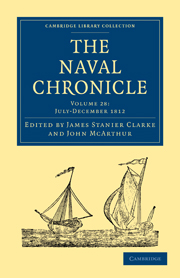 The Naval Chronicle
The Naval Chronicle Book contents
- Frontmatter
- PLATES IN VOLUME XXVIII
- PREFACE TO THE TWENTY-EIGHTH VOLUME
- MEMOIR OF THE PUBLIC SERVICES OF THE LATE CAPTAIN JOHN STEWART, R.N. COMMANDER OF H.M.S. SEAHORSE
- BIOGRAPHICAL MEMOIR OF GEORGE LEGGE, LORD DARTMOUTH, ADMIRAL OF THE FLEET, IN THE REIGN OF JAMES THE SECOND
- BIOGRAPHICAL MEMOIR OF THE LATE HENRY WHITBY, ESQ, CAPTAIN IN THE ROYAL NAVY
- BIOGRAPHICAL MEMOIR OF SALUSBURY PRYCE HUMPHREYS, ESQ. CAPTAIN IN THE ROYAL NAVY
- INDEX
BIOGRAPHICAL MEMOIR OF SALUSBURY PRYCE HUMPHREYS, ESQ. CAPTAIN IN THE ROYAL NAVY
Published online by Cambridge University Press: 10 January 2011
- Frontmatter
- PLATES IN VOLUME XXVIII
- PREFACE TO THE TWENTY-EIGHTH VOLUME
- MEMOIR OF THE PUBLIC SERVICES OF THE LATE CAPTAIN JOHN STEWART, R.N. COMMANDER OF H.M.S. SEAHORSE
- BIOGRAPHICAL MEMOIR OF GEORGE LEGGE, LORD DARTMOUTH, ADMIRAL OF THE FLEET, IN THE REIGN OF JAMES THE SECOND
- BIOGRAPHICAL MEMOIR OF THE LATE HENRY WHITBY, ESQ, CAPTAIN IN THE ROYAL NAVY
- BIOGRAPHICAL MEMOIR OF SALUSBURY PRYCE HUMPHREYS, ESQ. CAPTAIN IN THE ROYAL NAVY
- INDEX
Summary
“It is the first duty of an Officer, to support the honour of his Country.”
Captain humphreys was the officer who commanded H.M.S. Leopard, of 50 guns, at the time of her encounter with the U. S. frigate Chesapeake, in the month of June, 1807. The existing political differences with America—differences which, in some measure, have arisen from that encounter—therefore, render his services a subject of considerable interest to the British public; particularly when it is recollected, that, in executing the orders of his commander-in-chief, to search the Chesapeake for deserters, his conduct was the theme of very general approbation.
With the time of this gentleman's birth we are unacquainted; but we are informed that he entered the navy in the year 1790, under the auspices of the present Vice-admiral Vashon, with whom he immediately sailed, on board the Ardent, of 64 guns, to the West Indies. From the Ardent, he soon afterwards removed into the Trusty, the flag-ship of the late Sir John Laforey, Bart. then commander-in-chief on that station.
Passing through an unbroken series of active services, in the several gradations of midshipman, lieutenant, and commander, Captain Humphreys obtained post rank on the 8th of May, 1804; after which, he remained two years unemployed.—In the course of that period he married the eldest daughter and heiress of the late John Tirel Morin, Esq. of Weedon Lodge, Bucks.
- Type
- Chapter
- Information
- The Naval ChronicleContaining a General and Biographical History of the Royal Navy of the United Kingdom with a Variety of Original Papers on Nautical Subjects, pp. 353 - 513Publisher: Cambridge University PressPrint publication year: 2010First published in: 1812


